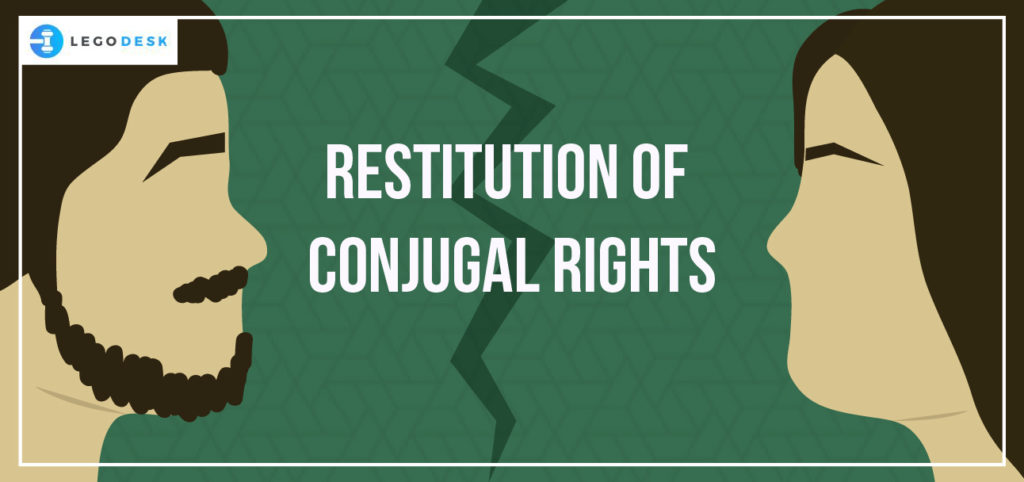All About Restitution of Conjugal Rights in India

Introduction to Restitution of Conjugal Rights
Marriage is a sacred and legal oath binding two persons (Husband and wife) and imposing certain duties, obligations, and rights to safeguard one’s own interest in the marriage. One of the duties is staying together. Restitution of Conjugal rights in India refers to the right of the partners, who are partners by the way of marriage to stay together with each other. Restitution of such rights is an attempt of the court to save the marriage and encourage reconciliation.
Every person is eligible to one’s own comfort and if a person wilfully with lawful reason withdraws himself/herself from the society of the partner, the other partner can put forth a petition of restitution of conjugal rights in the matrimonial courts. The court may pass a decree for restitution of conjugal rights if on reasonable grounds the court is satisfied that the withdrawal from the society of the spouse was not lawful. Such decree when passed creates an obligation on the spouse to stay together with the partner. However, no one can be forced against their will to stay with their spouse.
Constitutionality
- Sareetha v. T. Venkatasubbaiah[1], the High Court of Andhra Pradesh held the provision of Conjugal Rights as unconstitutional in 1983 as it was thought to be violative of Article 14 and 21 of the Indian Constitution. The Delhi High Court, in Harvinder Kaur v. Harminder Singh[2] had a different view from that of Andhra Pradesh court. The Supreme Court in a landmark judgment[3], upheld the view of Delhi High Court and reiterated restitution of Conjugal rights as constitutional.
Restitution of Conjugal Rights in India
Marriage is governed by personal laws in India. So, the remedy of restitution of Conjugal Rights is also governed by various personal laws namely:
- Section 9: Hindu Marriage Act, 1955 (For Hindus)
- Section 32 and 33: Indian Divorce Act, 1869 (For Christians)
- Section 36: Parsi Marriage and Divorce Act, 1936 (For Parsis)
- Section 22: Special Marriage Act, 1954 (For person married under SMA
Jurisdiction
The court to which an application for the restitution of conjugal rights can be made to a Civil Court in the jurisdiction of which:
- The marriage was commenced;
- The husband and wife stay together;
- The husband and wife last stayed together.
Section 9 of the Hindu Marriage Act, 1955
Section 9, Clause 1 deals with the provision of filing of a petition for restitution and granting a decree. There are three essential elements considering which the court will pass the decree for restitution of conjugal rights:
- The spouses must not be residing together.
- There must not be any reasonable ground for the withdrawal.
Withdrawing from society does not only mean staying away from the spouse. It also includes withdrawal from sexual intercourse, having an intention to abandon, non-cooperation and non-performance of marital obligation.
In the case of Sushila Bai v. Prem Narayan[4], the husband deserted the wife and was unresponsive for her. The court granted the decree of restitution of conjugal rights
- The party aggrieved by such separation must approach the court for the restitution.
Section 9, explanation talks about the burden of proof which lies on the spouse who has withdrawn from the living to prove the existence of reasonable grounds for such withdrawal.
However, initially, the burden of proof is on the petitioner to prove the withdrawal of the spouse from the society of the petitioner.
When can the decree be rejected?
The decree can be rejected on the basis of the following grounds:
- The right of the respondent to claim any matrimonial relief on the existence of sufficient grounds.
- The petitioner is guilty of matrimonial misconduct.
- The petitioner being guilty of such act/omission which makes it difficult for the respondent to stay with the petitioner.
Restitution of Conjugal Rights and divorce
If after passing the decree of conjugal rights, there has not been any restitution for a period of one year from the date of passing the decree, it becomes a valid ground for divorce under section 13 (1A). To ensure the enforcement of the decree, the property of the respondent is attached.[5] If the decree has not been complied with within a period of six months, then the court can sell the attached property.
Conclusion
Restitution of Conjugal rights is a debatable topic which gives rise to questions like being involved in the institution of marriage, isn’t restitution of conjugal rights violation of the right to life. The constitutionality has been upheld by the Supreme Court rendering it not violative of the fundamental right because it is the discretion of the court to ascertain what constitutes to be a justifiable reason. When the court is satisfied that a partner has without any valid justification withdrawn from the society of the other partner, the court shall order for the restitution of Conjugal efforts as an effort of reconciliation and to save the marriage.
[1] AIR 1983 AP 356
[2] AIR 1984 DEL 66
[3] Saroj Rani v Sudharshan AIR 1984 SC 1562
[4] AIR 1964 MP 225
[5] Order 21, Rule 32, Code of Civil Procedure, 1908